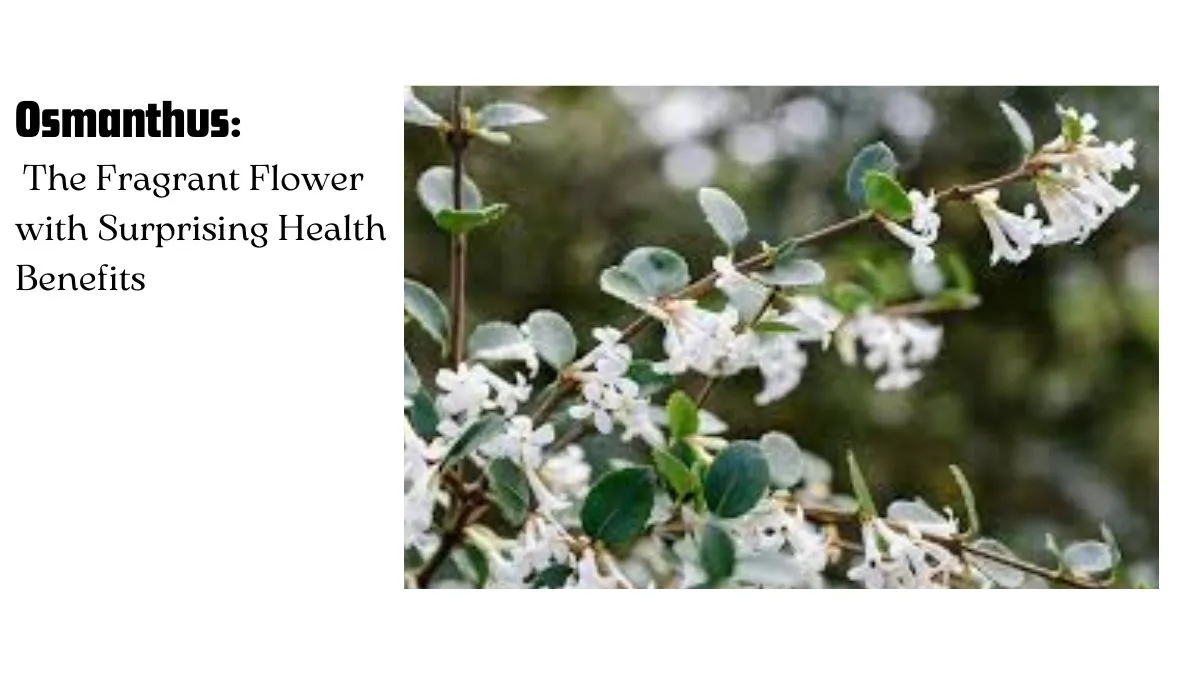HEALTH AND FITNESS
Osmanthus: The Fragrant Flower with Surprising Health Benefits

Osmanthus. A flower with a scent so sweet, it lingers in the air like a forgotten memory. For centuries, this delicate bloom has been cherished in Asia. It’s more than just a pretty flower. It’s history, culture and healing. From Chinese emperors sipping its tea to modern beauty gurus swearing by its skincare benefits, this tiny flower carries weight. And yet, so many people don’t know about it. But you will. Because once you experience Osmanthus, it’s impossible to forget.
The History and Origin of Osmanthus
Osmanthus has its origin in China, Japan, and the Himalayas. Myths tell us that its fragrance wafted in from the Moon Palace, a heavenly garden where gods reveled in its maddening scent. In ancient China, its wine coursed in imperial courts. Poets wrote of its ephemeral charm. Even now, its yellow flowers herald autumn’s arrival, commemorated in festivals throughout Asia. But it is more than nostalgia—it’s survival. Surviving for centuries, changing, thriving. The world evolves, but its scent does not change.
Different Types of Osmanthus
These plants are not all the same. Some white, some yellow. Some apricot-sweet, some ripely peach-fragrant. Osmanthus fragrans, which is the best known, sweetens whole city streets. Osmanthus heterophyllus? Spiny and hardy but endearing. Osmanthus delavayi? A diminutive but tenacious shrub that defies the cold with tough elegance. Then there’s the hybrid Osmanthus x burkwoodii, a soft-and-strong beauty. Each variety is its own story, its own presence. Yet all have in common one thing—the unmistakable scent of Osmanthus.
Osmanthus in Traditional Medicine
Ancient healers knew something we’re just rediscovering. It isn’t just pretty; it’s powerful. Traditional Chinese medicine used it for detoxifying the body, easing digestion, and even improving skin. People drank Osmanthus tea to soothe sore throats. They applied Osmanthus oil for joint pain. Some believed it even calmed the heart, balanced energy. Science now confirms its antioxidant properties. Rich in flavonoids, it fights inflammation, slows aging, protects cells. State-of-the-art medicine collides with old-school wisdom. And once more, it demonstrates that it’s not just a flower.
Nutritional and Chemical Composition
Behind its scent, it is hiding a secret. It’s loaded with polyphenols, carotenoids, and flavonoids—substances that combat oxidative stress, quell inflammation, and induce longevity. It’s Mother Nature’s response to contemporary illnesses. Unlike processed supplements, Osmanthus is delicate, organic, efficient. It doesn’t only flavor; it brings life. In tea, essential oil, or skin products, it performs from the inside out. Traditional healers can’t help but swear by it. And now science confirms them. It is not only a flower. It’s wellness in bloom.
Osmanthus Tea: Benefits and Preparation
Imagine this. A warm cup in your hands. The golden color glows, the steam carries a scent—peachy, floral, fresh. Its tea isn’t just a drink; it’s an experience. It aids digestion, calms stress, strengthens immunity. Making it is simple. Just steep dried Osmanthus flowers in hot water for 3–5 minutes. Want more flavor? Blend it with green tea or oolong. Some add honey, others sip it pure. One cup, and you’ll see. Osmanthus tea isn’t just refreshing. It’s a ritual, a moment of calm in a noisy world.
Osmanthus in Culinary Delights
Osmanthus isn’t just for tea. In China, it flavors jellies, mooncakes, and sweet soups. Chefs drizzle Osmanthus syrup over pancakes and ice cream. Even cocktails get a floral twist with Osmanthus-infused liquor. The taste? Light, fruity, slightly honeyed. It doesn’t overpower. It enhances. Imagine biting into a dessert, the delicate scent of this flower lingering on your tongue. It’s subtle yet unforgettable. From ancient kitchens to modern restaurants, it keeps evolving. A flower that belongs not just in gardens but on plates.
Osmanthus in Skincare and Beauty
Beauty brands love Osmanthus. And for good reason. It’s a natural anti-aging powerhouse. Rich in antioxidants, it fights wrinkles, brightens skin, locks in moisture. High-end perfumes use its scent—delicate yet deep, floral yet fruity. Essential oils infused with it nourish the skin, heal scars, add radiance. Some mix it with face masks, others add it to bathwater for a spa-like feel. No harsh chemicals. No artificial fragrances. Just pure, botanical luxury. The kind your skin will thank you for.

How to Cultivate and Maintain Osmanthus Plants
Thinking of adding this flower to your garden? You’ll be pleased to know it’s a low-maintenance yet highly rewarding plant. This evergreen shrub flourishes in locations with full sunlight and well-drained soil, requiring only occasional watering to thrive. It stands strong against pests, adapts to cold climates, and endures dry conditions with ease. To keep it looking its best, prune lightly after its flowering season. But the true magic of this flower lies in its blossoms. Once they open, their sweet, captivating fragrance transforms your garden into a sensory paradise. Growing Osmanthus isn’t just about cultivating a plant—it’s about welcoming an ancient botanical treasure into your space.
Where to Source Genuine Osmanthus Products
Ensuring the authenticity of Osmanthus-based products is essential, especially with so many counterfeits on the market. When purchasing it tea, examine its color—genuine tea possesses a rich golden tint and a naturally fruity, peach-like aroma. For essential oils, purity is paramount; steer clear of blends containing synthetic additives. Trustworthy suppliers often carry organic certifications and maintain a strong reputation backed by verified customer reviews. Whether you’re investing in tea made of it, skincare products, or syrups, quality makes all the difference. This delicate flower deserves appreciation in its most authentic form, as only pure Osmanthus offers its renowned benefits.
Final Thoughts
Osmanthus is more than just a plant—it’s a timeless symbol of beauty, wellness, and tradition. Its floral essence has enriched perfumes, teas, and healing remedies for centuries, proving its worth time and time again. While trends come and go, the delicate fragrance of it remains unchanged, continuing to captivate those who experience it. Whether you’re sipping its tea, using its oil, or simply admiring its blossoms, you’re embracing a piece of botanical history. The world moves forward, but this flower endures, waiting to be cherished by a new generation. Will you be the one to rediscover its wonders?
-

 BIOGRAPHY9 months ago
BIOGRAPHY9 months agoBehind the Scenes with Sandra Orlow: An Exclusive Interview
-

 HOME1 year ago
HOME1 year agoDiscovering Insights: A Deep Dive into the //vital-mag.net blog
-

 HOME2 years ago
HOME2 years agoSifangds in Action: Real-Life Applications and Success Stories
-

 BIOGRAPHY1 year ago
BIOGRAPHY1 year agoThe Woman Behind the Comedian: Meet Andrew Santino Wife




























